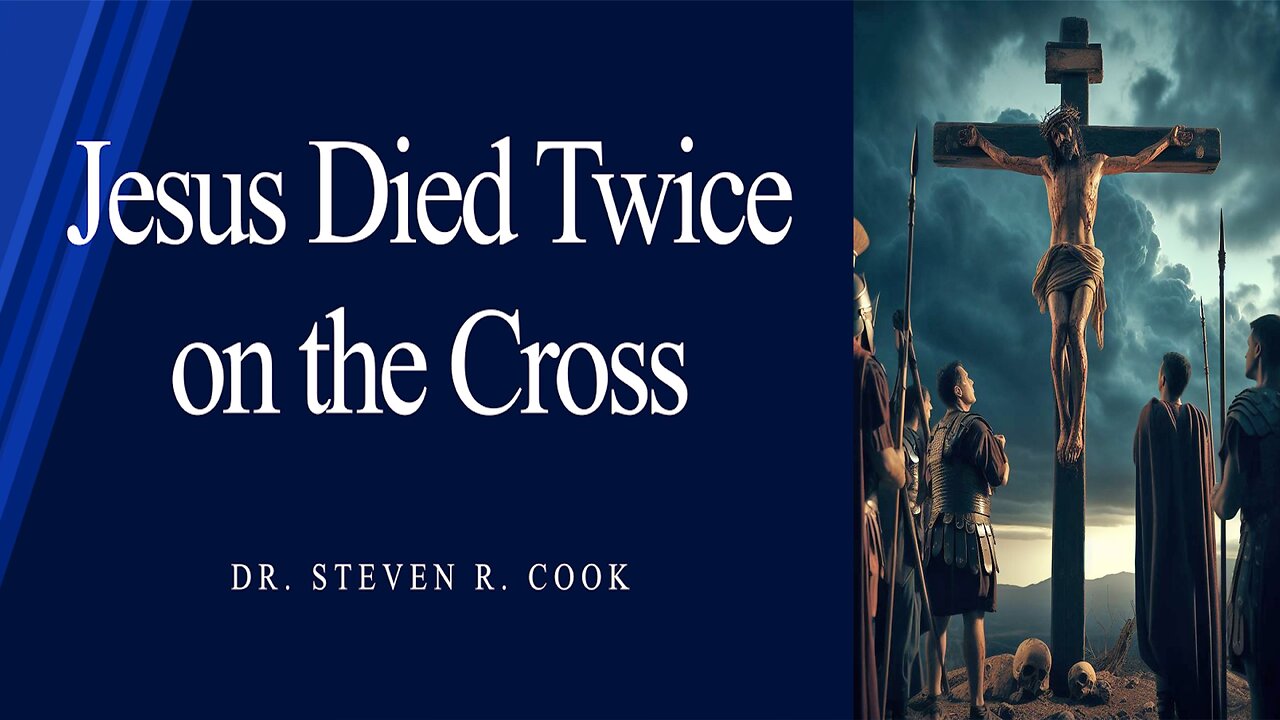Premium Only Content

Jesus Died Twice on the Cross
Biblically, death means separation. Three major kinds of death are mentioned in Scripture, and these include: 1) spiritual death, which is separation from God in time (Gen 2:16-17; 3:1-7; Rom 5:12; 1 Cor 15:22; Eph 2:1-2), 2) physical death, which is the separation of the human spirit from the body (Gen 35:18; Eccl 12:7; 2 Cor 5:8; Jam 2:26), and 3) the second death (aka eternal death), which is the perpetuation of physical and spiritual separation from God for all eternity (Rev 20:11-15). Spiritual and physical death were introduced into God’s creation when the first human, Adam, sinned against God. Adam’s sin instantly brought spiritual death (Gen 2:15-17; 3:1-7), but not immediate physical death, as he tried to hide physically from God (Gen 3:8-10). Later, Adam died physically at the age of nine hundred and thirty (Gen 5:5). Though Adam was made spiritually alive again (Gen 3:21), his single sin introduced death, in every form, into the world (Rom 5:12-14; 1 Cor 15:21-22). Except for Christ, all are born in Adam (1 Cor 15:21-22), inherit his original sin (Rom 5:12), and are spiritually dead and separated from God in time (Eph 2:1-2). Those who reject Jesus as Savior will experience the second death in the lake of fire.
Because all humanity experiences spiritual and physical death as consequences of sin, it seems that if Jesus is to be our Savior, then He must experience the same kind of death that that we experience. Both physical and spiritual death relate to Jesus’ humanity and not His deity. In His humanity, Jesus’ fellowship with the Father was temporarily broken during the three hours He was being judged for our sin. This was while God the Father poured out His wrath upon His Son who paid the penalty for our sins. Jesus’ spiritual death should not be understood to mean that there was a break in the essence of the Trinity, for that is not possible. In the hypostatic union, Jesus is undiminished deity and perfect humanity, and it was only His humanity that bore our sin, not His deity, for sin cannot be imputed to deity, for that would contaminate and corrupt God Himself. The writer to the Hebrews cites the words of God the Son as He was about to enter the world, saying, “Therefore, when He comes into the world [in hypostatic union], He says, ‘Sacrifice and offering You have not desired, but a body You have prepared for Me’” (Heb 10:5). Because animal sacrifices under the OT law code could never take away sin, a perfect and sinless body was prepared for Jesus, so that by His personal sacrifice, our sins could be atoned for. Peter tells us that Jesus “Himself bore our sins in His body on the cross” (1 Pet 2:24). Jesus’ spiritual death meant His humanity was—for three hours—disconnected from the Father while He was on the cross bearing our sins. According to Robert Thieme Jr., “Separated from God the Father, the humanity of Christ died spiritually, and this was the price paid to redeem fallen mankind from the penalty of sin (Rom 6:23a).” (Robert B. Thieme, Jr. Thieme’s Bible Doctrine Dictionary, 50). Arnold Fruchtenbaum states, “The Righteous One suffered and died in place of unrighteous ones, in order to bring them to God. The Messiah died a violent physical death, and He also died a spiritual death.” (Arnold G. Fruchtenbaum, Israelology, p. 999) J. Dwight Pentecost states:
“The penalty for disobedience to God was death (Gen 2:17). This death was the separation of the sinner from God—that is, spiritual death—and physical death was the result of prior spiritual death. Therefore if Jesus Christ was to satisfy the demands of God’s holiness, righteousness, and justice to provide salvation for people who are dead, He would have to experience the same death that separated them from God. He must enter into spiritual death, as anticipated in the prophetic 22nd Psalm where the sufferer cried, “My God, My God, why have You forsaken Me?” (Psa 22:1)…Since only that kind of separation or spiritual death could satisfy the demands of a holy, just God, Christ could not have been praying that He would be spared that which was essential.” (J. Dwight Pentecost and Ken Durham, Faith That Endures: A Practical Commentary on the Book of Hebrews, p. 96).
Jesus’ physical death occurred afterwards, when “He said, ‘It is finished!’ And He bowed His head and gave up His spirit” (John 19:30). When Jesus died physically, there was a separation of His human spirit from His body. To prove He was physically dead, Scripture records that a Roman soldier “pierced His side with a spear, and immediately blood and water came out” (John 19:34).
-
 11:39
11:39
Thinking on Scripture
15 days agoSpiritual Life, Lesson 14 - Biblical Meditation
101 -
 LIVE
LIVE
TimcastIRL
2 hours agoLIVE: Trump Joint Presidential Address, IRS To Fire 45,000 Staff w/Rachel Wilson | Timcast IRL
39,299 watching -
 LIVE
LIVE
Redacted News
1 hour agoLIVE: Renewal of the American Dream | Donald Trump Addresses Joint Session of Congress | Redacted
7,485 watching -
 LIVE
LIVE
vivafrei
8 hours agoDonald Trump to Address Congress! Viva Frei LIVE WITH COMMENTARY!
4,875 watching -
 LIVE
LIVE
Right Side Broadcasting Network
4 days agoLIVE: President Trump Addresses a Joint Session of Congress - 3/4/25
96,880 watching -
 LIVE
LIVE
The Charlie Kirk Show
1 hour agoTHOUGHTCRIME - The Renewal of the American Dream Speech Special
8,379 watching -

Kim Iversen
4 hours agoRFK Jr: Antisemitism Is a 'Health Threat' | Pam Bondi: Epstein Files Will Be Redacted For National Security??!
35.7K27 -
 LIVE
LIVE
Candace Show Podcast
2 hours agoWatch With Me: President Trump’s Address To Congress
3,564 watching -
 LIVE
LIVE
Benny Johnson
6 hours ago🚨President Trump's State of the Union Speech LIVE Right Now! We're INSIDE US Capitol, Special Guests
25,091 watching -
 LIVE
LIVE
Barry Cunningham
21 hours agoPRESIDENT TRUMP SPEECH ADDRESS TO JOINT SESSION OF CONGRESS | INTERVIEWS ALL DAY!
2,317 watching